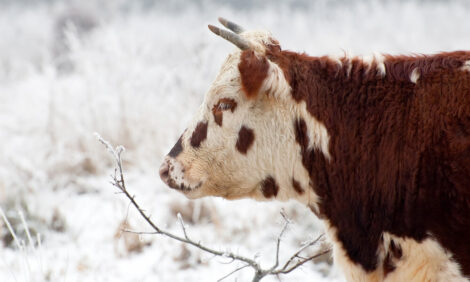



Scientists Start War On Animal Diseases
UK - Endemic animal diseases cost UK farmers, and indirectly consumers, hundreds of millions of pounds a year and cause significant animal welfare problems. £11.5M of new research launched today aims to tackle some of the most harmful and widespread diseases that commonly affect farmed animals in the UK. The initiative will improve the sustainability of UK farming by ultimately reducing the cost of treating diseases and the loss of affected livestock.The initiative, led by the Biotechnology and Biological Sciences Research Council (BBSRC), is supporting 10 projects across the UK that will employ cutting-edge bioscience to study the diseases and which will contribute to improved animal health and welfare, as well as reduced economic losses. The research will generate better scientific understanding of the behaviour and spread of the diseases which can then be used to improve their management and control.
The initiative, Combating Endemic Diseases of Farmed Animals for Sustainability (CEDFAS), is also backed by the Scottish Executive and some individual projects have additional funding from Defra and industrial partners.
Full details of all of the projects funded by the new initiative are available in a media briefing at: http://www.bbsrc.ac.uk/media/briefings/cedfas.pdf [480KB]
Examples include:
Bovine TB – this economically damaging disease is on the rise with 700 herds failing a bovine TB test in the UK each year. One reason for the increasing incidence could be that the Mycobacterium bovis bacterium that causes infection is evolving to beat current control methods. This project will examine the genetics of the bacterium to uncover whether new strains are able to change an animal’s immune response to evade control.
Post-weaning multi-systemic wasting syndrome (PMWS) – a very common viral disease of pigs which, although it was identified in the UK only in 1999, has now spread across the country. It has a high mortality rate and causes significant suffering for the animals, with symptoms including wasting, diarrhoea, pneumonia and jaundice. Working closely with UK pig farmers, and with support from the British Pig Executive, this project will identify why the disease occurs and work on ways to control it.
Bovine mastitis – affects over one million cattle a year, causing the animals pain and distress and costing UK farming over £200M. This project will study the Streptococcus uberis bacterium that causes most cases of bovine mastitis, with the aim of identifying proteins for new vaccines and chemical signals that could be shut down by new therapies.
Footrot in sheep – lameness is very painful for sheep and costs around £31M a year in the UK. Much lameness is caused by footrot, a bacterial infection. Currently we know little about how the bacterium, Dichelobacter nodosus, survives on the sheep or in the environment. This project aims to investigate this in order to advise farmers on controlling infection.
Professor Nigel Brown, BBSRC Director of Science and Technology, said: “Endemic animal diseases cost UK farmers and consumers huge amounts of money every year and cause real suffering for animals. The projects launched today are targeted at bringing the country’s world-class science to bear against some of the most damaging diseases. By working with farmers and industry, scientists can make a real difference in areas where help is needed.”
Representatives from the farming community and animal industries have had a key role in shaping the initiative to ensure that the diseases being studied are those where advances would have a real impact for farmers and consumers.
Chris Warkup, Director of the Genesis Faraday Partnership in animal genetics and genomics and member of the initiative panel, commented: “Research on endemic disease came out as the top priority when we developed a technology roadmap for the animal breeding and animal health sectors, so this new initiative by BBSRC and other sponsors is a really good match between industrial need and high quality research. The diseases are all high priorities for the industry and new approaches to their control will improve animal welfare, improve economic sustainability and help reduce the environmental impact of the food production industry.”
Bovine Tuberculosis.
Mastisis
TheCattleSite News Desk


